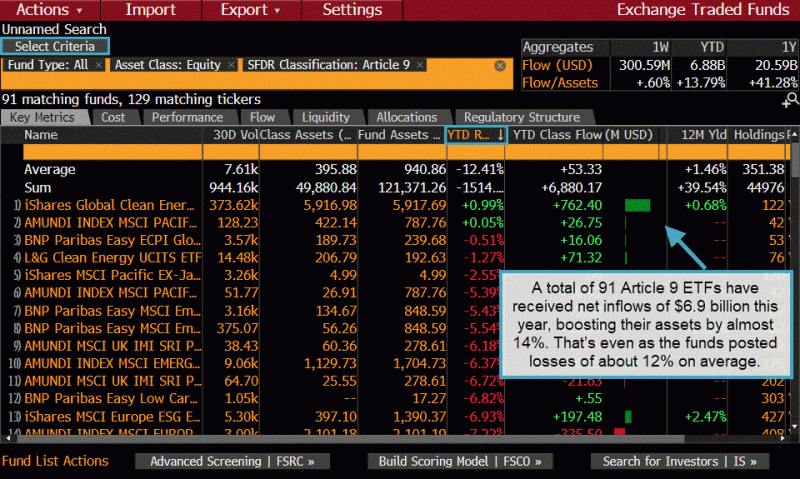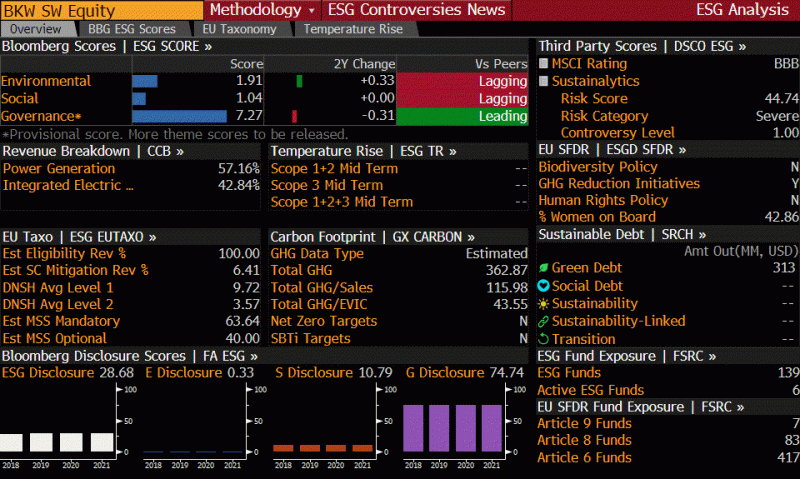Global push to build trust on ESG may help stamp out greenwashing
Bloomberg Market Specialist Karen Ho contributed to this article. The original version appeared first on the Bloomberg Terminal.
Background
The lack of consistent standards for assets with the environmental, social and governance (ESG) label has caused growing concerns for investors and regulators. Following a wave of new regulations in the European Union, other countries are looking to tighten restrictions over the use of the label, which can be found on everything from exchange-traded funds to complex derivatives.
ESG has found plenty of detractors recently, including conservative U.S. politicians seeking to limit public pension fund investment in ESG, as well as Tesla CEO Elon Musk in reaction to the automaker’s removal from the S&P 500 ESG Index. Others have been critical of funds that invested in Russian securities ahead of that country’s invasion of Ukraine and the ratings firms whose standards gave the green light to those securities’ ESG status.
Canadian regulators are working to improve climate-related disclosures for issuers, while China is rolling out voluntary guidelines for companies to report metrics related to their sustainability efforts. And to the consternation of many on Wall Street, the U.S. Securities and Exchange Commission (SEC) has proposed rules to ensure that funds labeled as ESG invest at least 80% of their assets in a manner that aligns with established ESG strategy. The SEC also wants to require additional disclosures in annual reports and marketing materials that explain how funds and financial advisers take ESG into consideration when investing, and for funds to report their greenhouse gas emissions.
“It is important that investors have consistent and comparable disclosures about asset managers’ ESG strategies so they can understand what data underlies funds’ claims and choose the right investments for them,” SEC Chair Gary Gensler said in a statement.
Alongside evolving regulation and policy change, sustainable investment assets continued to grow. According to the 2020 Global Sustainable Investment Review (GSIR), from 2018-2020, Canada and the U.S. experienced the largest increases in sustainable investment assets in absolute terms (48% and 42% growth, respectively), followed by Japan (34% growth) and Australasia (25% growth). The regional breakdown from 2018-2020 was largely unchanged, with the U.S. and Europe representing more than 80% of global sustainable investing assets.
The issue
The European Supervisory Authority’s Sustainable Finance Disclosure Regulation (SFDR) defines an Article 9 fund as “a Fund that has sustainable investment as its objective or a reduction in carbon emissions as its objective.” A Bloomberg analysis revealed a total of 91 Article 9 ETFs have received net inflows of $6.9 billion this year, boosting their assets by almost 14%. That comes as the funds posted losses of about 12% on average. Of these, the iShares Global Clean Energy ETF was the best performer, raking in $762 million this year and gaining 1%. Bloomberg’s ETF functions can be used to track fund inflows and assess performance.

While the iShares Global Clean Energy ETF has been 2022’s best-performing sustainability fund, a deeper look at the ESG metrics of companies in the fund show some with severe risk profiles. There were six companies with a severe rating under the Sustainalytics ESG Risk Category as of May 30, including U.S. biotech firm Aemetis Inc. and energy supply and solutions firm BKW Energie AG of Switzerland.
Sustainability investing has been dogged by claims of greenwashing – companies inflating their ESG credentials in order to attract capital or customers. Regulators are attempting to focus on transparency and conflicts of interest while requiring companies to demonstrate the validity of metrics, with the U.S. joining the EU last week in considering stricter parameters for sustainability assessments. A global drive by governments to fight greenwashing may help investors identify where to place their bets in the fastest-growing corner of ESG investing.
Tracking
Use Bloomberg’s ESG functions to track a company’s ESG profile.

For more information on this or other functionality on the Bloomberg Professional Service, request a demo with a Bloomberg sales representative. Existing clients can press <HELP HELP> on their Bloomberg keyboard.